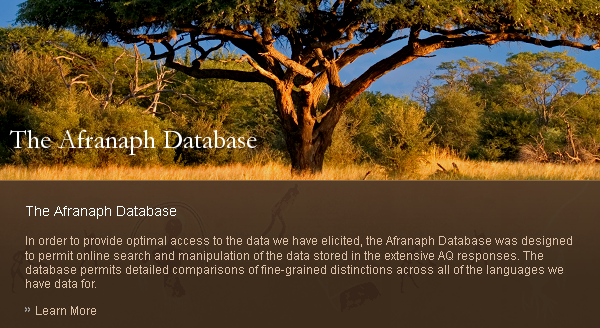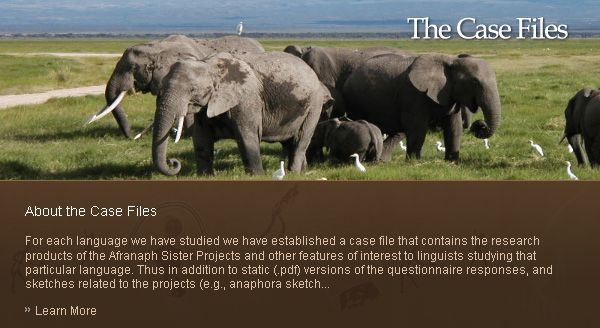- Last Updated on Wednesday, 21 September 2016 10:30
More on word search
If you are looking for a particular analytic entity, such as an anaphoric marker, you can also use word search. Open the anaphora portal. Set the entity search to ‘anaphoric marker’. Open the anaphoric marker drop-down. At the top you will see two lines, one for the name of the entity and the other for a description of the entity (which is always a shorthand designation). If you are looking for the specific anaphoric marker khwe (from Lubukusu) then enter it under ‘Name’,
| Name | |
| Description |
but if you know it better by its description, then enter ‘infinitival RFM’.
| Name | |
| Description |
If you then click the search button it should produce the entry for that anaphoric marker. We don’t recommend using the Description line, since many markers have similar descriptions and our descriptions are not systematically based on the Database Property Attribution Guide (the description is just used as a mnemonic device for those of us who use the AD a lot).
There are a few small devices to improve word searches by adding diacritics to the word you are searching for such as ‘AND’, ‘OR’, and ‘-‘. Be careful in looking for suffixes – if you look for the gloss suffix ‘RCM’, for example, where RCM is a suffix, don’t search for it by specifying ‘-RCM’, or you will instead get all of the entities that do not have ‘RCM’ in them.
Now suppose you want to run a search that will return a set of languages. Our Language properties are scarce at this writing (2016), and so most of the searches we run for languages are based on properties of the entities in those languages. For example, suppose you want to find all of the languages that use a PASS morpheme. Since we don’t have property for language entities ‘has a passive construction’ at this time, we can find this out using a word search. Open the Sentence properties and enter PASS in the gloss line just as in the sentence search described above.
| Original text | |
| Morphemic tier | |
| Gloss | |
| Translation |
Now set the entity search for ‘Languages’. Hit the Search button under ‘Search for’. All of the languages that have sentences with a passive morpheme should then be listed. What is different about this search is that we selected a property of sentence entities to delimit our search for another entity type, namely, the Language entity. This is a major feature of the search mechanisms designed for our database: In portals with lots of entities, the specificity of search options for a particular entity type can be very carefully tailored by setting the properties of other entities, as in some of our Sample Searches.
Recall that there is a danger of false positives in word searches of this kind, namely, if a language has just one sentence with a gloss of a word that has the sequence /pass/ then it will appear as if it is a language that has sentences with the PASS morpheme. THIS IS AN IMPORTANT CAVEAT. The AD is a tool, not a wizard, and so you have to interpret and check up on the results that it gives you. Our results are not better than what our algorithms allow and sometimes results are misleading. See Limitations of the AD and tools like it.






